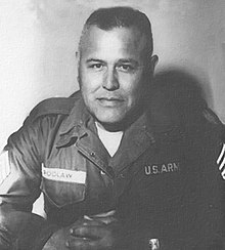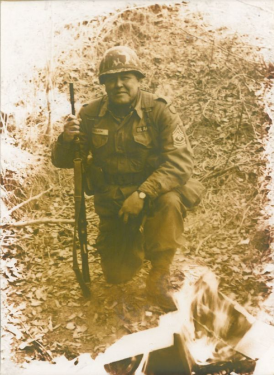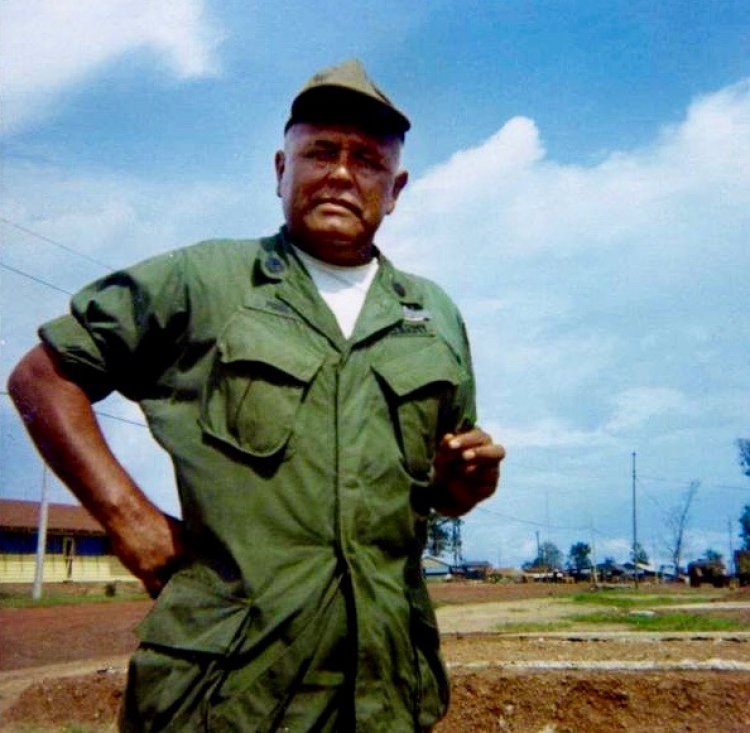
 |
|
|
||
|
Pascal Cleatus Poolaw, Sr. |
||||
|
Engagements: • World War II (1941 - 1945)• Korean War (1950 - 1953)• Vietnam War (1960 - 1973) |
||||
| Biography: | ||||
|
Pascal Cleatus Poolaw, Sr. Pascal Cleatus Poolaw, a full-blooded Kiowa Indian from Anadarko, OK, joined the U.S. Army on 27 August 1942 during World War II. World War II On 8 September 1944, then-Staff Sergeant Pascal Cleatus Poolaw was serving with Company M (Heavy Weapons), 3rd Battalion, 8th Infantry Regiment, 4th Infantry Division, U.S. Army in the European Theater of Operations. On that day, SSG Poolaw’s unit was in action against German forces near Recogne, Belgium, during the Siegfried Line Campaign. While attacking in support of a rifle company, SSG Poolaw displaced his machine gun squad forward, across an open field, under heavy mortar and small arms fire. The squad was positioned in such a manner as to minimize the casualties in his squad. After reaching the new position, SSG Poolaw saw the enemy advancing in a strong counterattack. Standing in the face of withering machine gun fire, unflinchingly, for 5 minutes, SSG Poolaw hurled hand grenades until the German force had sustained numerous casualties and dispersed. Due to SSG Poolaw's actions, the lives of many of his men were saved and M Company was able to continue the attack and capture strongly-defended German positions. SSG Poolaw’s courageous actions that day earned him the U.S. Army's third highest award for valor, the Silver Star Medal. Korean War On 19 September 1950, then-Sergeant First Class Poolaw was serving with Company C, 1st Battalion, 27th Infantry Regiment, 25th Infantry Division, U.S. Army, in Korea. On that day, SFC Poolaw’s Company C was in action against enemy forces when the company attack on an enemy position was halted by stiff resistance. SFC Poolaw volunteered to lead his squad in an assault and then courageously led his men in a charge up the slope to penetrate the enemy perimeter and engage the numerically-superior enemy in fierce hand-to-hand combat. SFC Poolaw's bold action inspired his men to hold their position until the rest of C Company could seize the objective. SFC Poolaw’s outstanding leadership and courageous actions that day earned him a Bronze Oak Leaf Cluster in lieu of a Second Award of the Silver Star Medal. On 4 April 1951, near Chongong-ni, Korea, while Company C was attacking strong hostile positions, one squad of then-Master Sergeant Poolaw's platoon was immobilized by a devastating barrage of automatic weapons and mortars. Exposing himself to the deadly fire, MSG Poolaw slowly advanced across open terrain, firing his rifle as he progressed. By deliberately diverting the attention of the enemy upon himself, MSG Poolaw enabled his men to maneuver to more advantageous positions. MSG Poolaw's valorous actions were instrumental in the fulfillment of the unit mission and earned him a Second Bronze Oak Leaf Cluster in lieu of a Third Award of the Silver Star Medal. Poolaw's military career with its 4 years of combined combat experience in World War II (1943-45) and Korea (1950-52) was impressive. Although he received a battlefield commission to Second Lieutenant during the Korean War and later promoted to First Lieutenant, he later relinquished it. He retired from the Army in 1962. Vietnam War Poolaw's son, Pascal Jr., had joined the Army and was serving in the Vietnam War. In February 1967, he was wounded in both legs by a landmine and had to have his right leg amputated below the knee. Poolaw's youngest son, Lindy, was also drafted and had received orders to deploy to Vietnam shortly. Upon learning about the orders for deployment, Poolaw came out of retirement and volunteered for the combat zone with the hope of serving there in place of his son; sparing him the horrors of war. [Poolaw even gave up his rank as a First Lieutenant, a promotion he earned during the Korean War, so that he could serve in the field in combat.] Regulations prohibit 2 members of the same family from serving in combat at the same time without their consent. When Poolaw finally reached the port of departure on the West Coast, he discovered Lindy had left for Vietnam the day before. Having the father and son of the family serving in combat at the same time was nothing new to Poolaw. He had served in World War II with his dad, Ralph Poolaw Sr., and his two brothers. He decided to follow his son to Vietnam and was deployed on 31 May 1967, as the First Sergeant of Company C, 26th Infantry Regiment, 1st Infantry Division. On 7 November 1967, First Sergeant Poolaw was serving with Company C, 26th Infantry Regiment, 1st Infantry Division in Vietnam. On this date, during Operation Shenandoah II, 1SG Poolaw was accompanying his unit on a 2-company search and destroy mission near Loc Ninh. As the patrol was moving through a rubber plantation, they were subjected to sniper fire. Within minutes, the area was raked with intensive Claymore mine, rocket, small arms, and automatic weapons fire from a numerically-superior Viet Cong force. 1SG Poolaw ran to the lead squad, which was receiving the brunt of the enemy fire. Ignoring his personal safety, 1SG Poolaw exposed himself while deploying the men and establishing an effective base of fire. Although wounded, 1SG Poolaw continued to move about the area encouraging his men and pulling casualties to cover. 1SG Poolaw was assisting a wounded man to safety when he was mortally wounded by Viet Cong fire. His dynamic leadership and exemplary courage contributed significantly to the successful deployment of the lead squad and undoubtedly saved the lives of many of his fellow soldiers. 1SG Poolaw's selfless actions earned him a Third Bronze Oak Leaf Cluster in lieu of a Fourth Award of the Silver Star Medal. To this day, First Lieutenant Pascal Cleatus Poolaw, Sr. is considered the most decorated Indian soldier in U.S. military history. In a letter he wrote just before his death, Poolaw said he rated his job as being more important than his life. Medals, Awards and Badges Silver Star Medal with 3 Bronze Oak Leaf Clusters Silver Star Medal Citation (1st of 4 Awards) em>The President of the United States of America, authorized by Act of Congress July 9, 1918, takes pleasure in presenting the Silver Star to Staff Sergeant Pascal Cleatus Poolaw (ASN: 18131087), United States Army, for gallantry in action against the enemy while serving with Company M, 8th Infantry Regiment, 4th Infantry Division, near Recogne, Belgium, on 8 September 1944. While attacking in support of a rifle company, Sergeant Poolaw displaced his machine gun squad forward across an open field under heavy mortar and small arms fire in such a manner as to effect a minimum number of casualties among his squad. After reaching his new position, Sergeant Poolaw saw the enemy advance in a strong counterattack. Standing unflinchingly in the face of withering machine gun fire for five minutes, he hurled hand grenades until the enemy force sustained numerous casualties and was dispersed. Due to Sergeant Poolaw's actions, many of his comrades' lives were saved and the company was able to continue the attack and capture strongly defended enemy positions. Sergeant Poolaw's display of courage, aggressive spirit and complete disregard for personal safety are in keeping with the highest traditions of the military service. Headquarters, 4th Infantry Division, General Orders No. 6 (1946) Silver Star Medal Citation (2nd of 4 Awards) The President of the United States of America, authorized by Act of Congress, July 9, 1918, takes pleasure in presenting a Bronze Oak Leaf Cluster in lieu of a Second Award of the Silver Star to Sergeant First Class Pascal Cleatus Poolaw (ASN: 18131087), United States Army, for conspicuous gallantry and intrepidity in action while serving with Company C, 27th Infantry Regiment, 25th Infantry Division. On 19 September 1950 when the company attack on an enemy position was halted by stiff enemy resistance, Sergeant First Class Poolaw volunteered to lead his squad in an assault. Courageously leading his men in a charge up the slope to penetrate the enemy perimeter and engage the numerically superior enemy in fierce hand-to-hand combat, Sergeant First Class Poolaw inspired his men to hold their position until the remainder of the company was able to seize the objective. Sergeant First Class Poolaw's outstanding leadership reflects great credit upon himself and is in keeping with the highest traditions of the American Soldier. Headquarters, 25th Infantry Division, General Orders No. 413 (November 25, 1950) Silver Star Medal Citation (3rd of 4 Awards) The President of the United States of America, authorized by Act of Congress, July 9, 1918, takes pleasure in presenting a Second Bronze Oak Leaf Cluster in lieu of a Third Award of the Silver Star to Master Sergeant Pascal Cleatus Poolaw (ASN: 18131087), United States Army, for conspicuous gallantry and intrepidity in action while serving with Company C, 27th Infantry Regiment, 25th Infantry Division. On 4 April 1951 near Chongong-ni, Korea, while attacking strong hostile positions, one squad of Master Sergeant Poolaw's platoon was immobilized by a devastating automatic weapons and mortar barrage. Exposing himself to the deadly fire, he slowly advanced across open terrain, firing his rifle as he progressed. By deliberately diverting the attention of the foe to himself, he enabled his men to maneuver to more advantageous positions. Master Sergeant Poolaw's valorous actions were instrumental in the fulfillment of the unit mission and are in keeping with the highest traditions of the American Soldier. Headquarters, 25th Infantry Division, General Orders No. 306 (May 29, 1951) Silver Star Medal Citation (4th of 4 Awards) The President of the United States of America, authorized by Act of Congress, July 8, 1918 (amended by act of July 25, 1963), takes pride in presenting a Third Bronze Oak Leaf Cluster in lieu of a Fourth Award of the Silver Star (Posthumously) to First Sergeant Pascal Cleatus Poolaw (ASN: 18131087), United States Army, for gallantry in action against a hostile force in the Republic of Vietnam on 7 November 1967, while serving with Company C, 26th Infantry Regiment, 1st Infantry Division. On this date, during Operation SHENANDOAH II, First Sergeant Poolaw was accompanying his unit on a two-company search and destroy mission near Loc Ninh. As the patrol was moving through a rubber plantation, they were subjected to sniper fire. Within minutes, the area was raked with intensive claymore mine, rocket, small arms, and automatic weapons fire from a numerically superior Viet Cong force. First Sergeant Poolaw unhesitatingly ran to the lead squad which was receiving the brunt of the enemy fire. With complete disregard for his personal safety, he exposed himself to assist in deploying the men and establishing an effective base of fire. Although wounded, he continued to move about the area encouraging his men and pulling casualties to cover. He was assisting a wounded man to safety when he was mortally wounded by Viet Cong fire. His dynamic leadership and exemplary courage contributed significantly to the successful deployment of the lead squad and undoubtedly saved the lives of many of his fellow soldiers. First Sergeant Poolaw's unquestionable valor in close combat against numerically superior hostile forces is in keeping with the finest traditions of the military service and reflects great credit upon himself, the 1st Infantry Division, and the United States Army. Headquarters, 1st Infantry Division, General Orders No. 8380 (November 20, 1967) Honors ● A building at Fort Sill Army Base in Lawton, OK, where he was stationed prior to his deployment to Vietnam, is named 'Poolaw Hall' in his honor and contains an exhibit dedicated to this full-blooded Kiowa soldier. Burial First Lieutenant Pascal Cleatus Poolaw, Sr. is buried at the Fort Sill Post Cemetery in Fort Sill, Comanche County, OK, in Section III, Site 2302. https://www.findagrave.com/memorial/21687835/pascal-cleatus-poolaw |
||||
| Honoree ID: 271066 | Created by: MHOH | |||
Ribbons
Medals
Badges
Honoree Photos
 |  |  |
 |  |
 |


